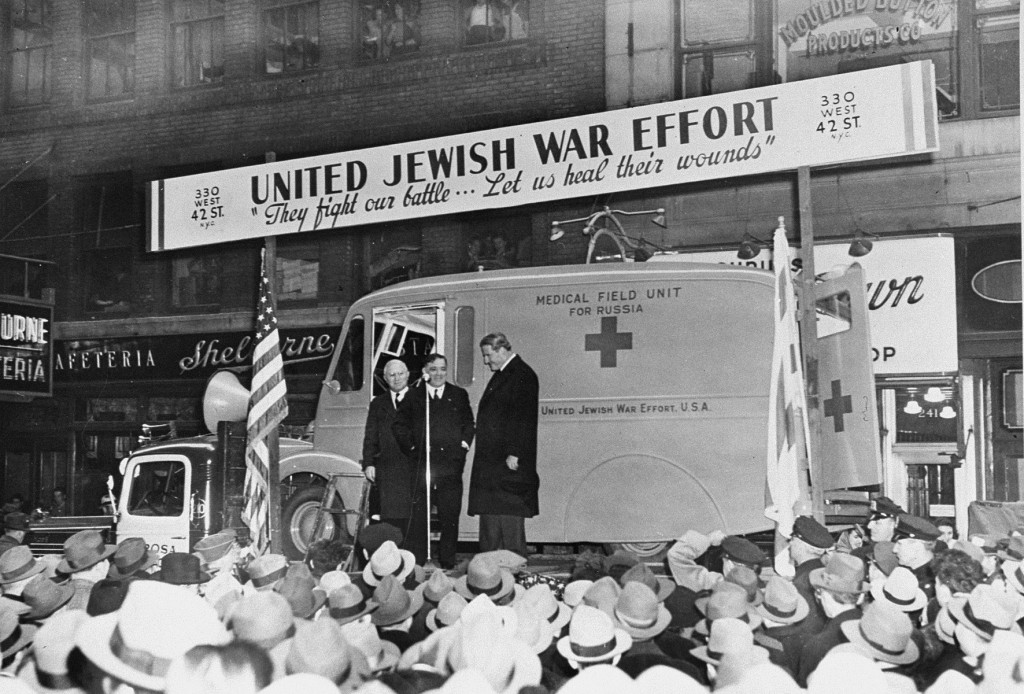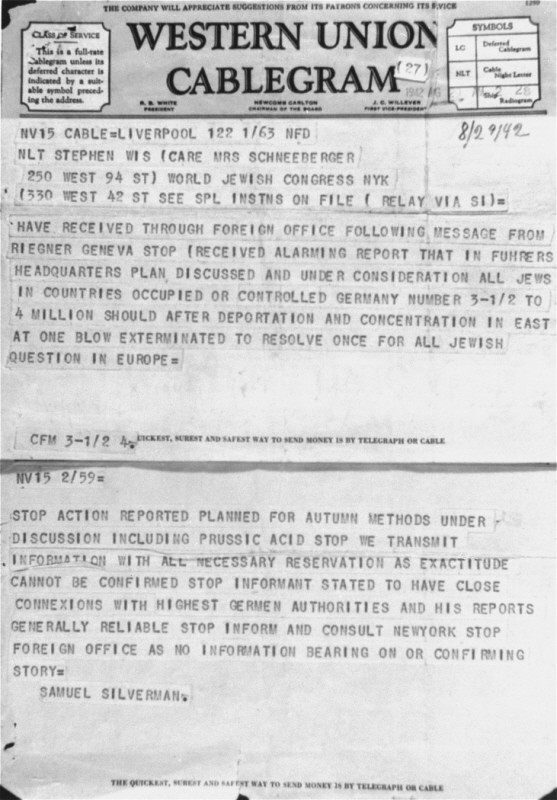
Stephen S. Wise
Stephen Wise (1874–1949) was a prominent US Jewish leader in the 1933–1945 period.
Born in Budapest in 1874 and the grandson of the Chief Rabbi of Eger, Hungary (a town about sixty miles northeast of Budapest), Stephen Wise immigrated to New York as a child. After his ordination as a Reform rabbi, he led a congregation in Portland, Oregon, where his liberal political convictions inspired him to fight for child labor laws and for the demands of striking workers. A charismatic orator, he became a champion for social justice and civil rights and was one of the founders of the National Association for the Advancement of Colored People. He later became a strong advocate and vocal supporter of Franklin Delano Roosevelt's “New Deal.”
Unlike most Reform rabbis and congregants at the time, Wise became a Zionist, committed to the establishment of a Jewish state. He attributed this to his first encounter with Theodor Herzl, the founder of modern Zionism, at the second Zionist Congress in 1898. During that meeting Wise was elected to the Zionist General Action Committee. In 1914, he served as deputy to Louis Brandeis when Brandeis became head of the American Zionist movement. Both men were instrumental in obtaining President Woodrow Wilson's support for the Balfour Declaration of 1917, which committed Great Britain to facilitate the establishment of a Jewish national home in Palestine. Wise founded the American Jewish Congress in 1920, became president of the Zionist Organization of America in 1936, and continued to play a key role in the US Jewish community for the rest of his life.
Shortly after Hitler came to power in 1933, Wise became an outspoken opponent of Nazi Germany and attempted to rally US public opinion against it. He organized mass anti-Nazi protests in New York City's Madison Square Garden and called for an end to the antisemitism of the Third Reich. He joined a movement to boycott German goods. He was instrumental in the creation of the World Jewish Congress, a broad, representative body established in Geneva in 1936 to fight Nazism. A friend and supporter of President Roosevelt, Wise attempted to use his influence to urge Roosevelt to actively oppose the Hitler regime. He also tried to win Roosevelt's support for unrestricted Jewish emigration to Palestine and the admission of more Jewish refugees into the United States.
Wise's influence, sometimes expressed in a warning that Jews might vote for the Republicans in the 1936 election, led Roosevelt, in several campaign speeches from August to October of that year, to speak out both on behalf of Palestine as a Jewish homeland, and in opposition to British intent to curb Jewish immigration. Wise may also have influenced Roosevelt to ask the State Department to ease visa requirements for German Jews seeking entry to the United States, which led to the admission of a larger number of Jewish refugees from 1936 to 1939. As a member of Roosevelt's Advisory Commission on Political Refugees (1938–1945), chaired by James G. McDonald, Wise assisted in the resettlement of German Jews and explored various possibilities for their immigration to various countries. His attempts to unify the American Jewish community ultimately failed, as conservative Jews opposed his anti-German militancy, his Zionism, his vocal liberalism, and his support for the “New Deal”.

Information about Nazi atrocities against Jews leaked out of Europe; fragmentary reports had appeared in the US press in 1941. In May 1942, the Polish-Jewish underground smuggled out a report which estimated that 700,000 Polish Jews had already been killed by the Germans. The report was broadcast over the BBC on June 2, 1942, by Samuel Zygelbojm, a leader of the Jewish underground who had reached London. On August 28, 1942, Wise received a cable, originally sent by Gerhart Riegner, the World Jewish Congress representative in Geneva, revealing the existence of a comprehensive German plan to murder the Jews of Europe.
At a press conference on November 24, 1942, after the US government confirmed the general accuracy of the information in the cable, Wise broke the news to the American press and public, and appealed to President Roosevelt to make an effort to stop the German murder plan. On December 17, 1942, the United States, Great Britain, and ten Allied governments-in-exile joined in a formal declaration denouncing Nazi implementation of “Hitler's oft-repeated intention to exterminate the Jewish people in Europe.”
Beginning in 1943, Wise found himself increasingly isolated. His strong faith in Roosevelt in the face of his inability to persuade the administration to launch serious rescue efforts on behalf of the Jews of Europe greatly weakened the aging leader's influence, as did his inability to unite American Jewry on a common course of action in response to Nazi mass murder and the British blockade of Palestine. His leadership of the Zionist movement was successfully challenged by the more militant Rabbi Abba Hillel Silver of Cleveland, who replaced Wise as the leader of American Zionism from 1943 to 1948.
Wise was also confronted by the even greater militancy of the Revisionist Zionists, headed by Peter Bergson, who favored mass protests in the United States in spite of the war, and who also advocated violence against the British in Palestine. It was ironic that Wise, who, despite his privileged background, was considered a radical earlier in his career, was now considered too much of an establishment moderate, too weak, and too close to Roosevelt.
Wise was appointed as a special representative of the Jewish Agency for Palestine to the United Nations Conference in San Francisco in 1945. He testified before the Anglo-American Commission of Inquiry in 1946, and lived long enough to witness the creation of the State of Israel in 1948.
Wise's role as the leading American Jewish leader during the 1933–1945 period made him a natural target for criticism. He was unable to influence lawmakers in Congress to adjust quotas set by the Johnson-Reed Act. He could not change British policy in Palestine. Ultimately, he could not persuade the Roosevelt administration or Great Britain to build rescue missions to save Jews into their strategy to win the war. There is no doubt, however, that Stephen Wise was a pivotal religious, Zionist, civic, and civil rights figure, and one of the most important Jewish leaders of the twentieth century
Critical Thinking Questions
What pressures and motivations may have affected Wise’s choices during the Holocaust?
How did Wise’s choices parallel or conflict with the approaches and ideas of other leaders of the Jewish community?
What obligations, if any, do religious leaders have to speak out and/or act in the face of threatened populations of any faith?

